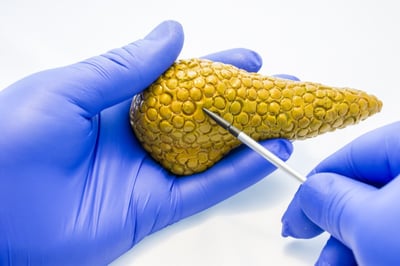FORCE's eXamining the Relevance of Articles for You (XRAY) program looks behind the headlines of cancer news to help you understand what the research means for you.
XRAY is a reliable source of hereditary cancer research-related news and information.
Learn more about the XRAY program
Categories Genetic Testing
Relevance: High


Strength of Science: High


Research Timeline: Post Approval


Study : Mutations in BRCA1 or BRCA2 may increase risk for endometrial cancer
Relevance: High


Strength of Science: High


Research Timeline: Post Approval


Most relevant for: People with BRCA1 or BRCA2 mutations
A Dutch study added further evidence that women with a BRCA1 mutation may have an elevated risk for endometrial cancer. The study found that the endometrial cancer in women with either a BRCA1 or BRCA2 mutation was more likely to be an aggressive form of cancer associated with a poor outcomes. (posted 11/30/21)
Este artículo está disponible en español.
Read More
Relevance: High


Strength of Science: High


Research Timeline: Post Approval


Study : Frequency of inherited mutations linked to breast cancer are similar in Black and white women
Relevance: High


Strength of Science: High


Research Timeline: Post Approval


Most relevant for: Non-Hispanic Black and white women with breast cancer
The CARRIERS study looked at the rate of inherited mutations in women with and without breast cancer. In an extension of the CARRIERS study, researchers found no difference in the frequency of inherited mutations in breast cancer genes among Black and white women with breast cancer. A few individual genes differed in frequency: BRCA2 and PALB2 mutations were seen more often in Black women, while CHEK2 mutations were seen less often. Researchers concluded that race should not be used to determine who is referred for genetic testing. (posted 8/13/21)
Este artículo está disponible en español.
Read More
Article : Overview of pancreatic cancer treatment options
Most relevant for: People with pancreatic cancer
This review looks at current strategies for pancreatic cancer care and potential future therapies. (posted 7/28/21)
Este artículo está disponible en español.
Read More
Relevance: High


Strength of Science: High


Research Timeline: Post Approval


Study : Cancer risks of people with inherited PALB2 mutations
Relevance: High


Strength of Science: High


Research Timeline: Post Approval


Most relevant for: people with inherited PALB2 mutations
In the largest study of people with inherited PALB2 mutations to date, the gene was linked to increased lifetime risk of breast cancer in women and men, ovarian and pancreatic cancer but not prostate or colorectal cancer. (posted 7/1/21)
Este artículo está disponible en español.
Read More
Relevance: Medium-High


Strength of Science: Medium-High


Research Timeline: Human Research


Study : Breastfeeding may lower risk of ovarian cancer in women with BRCA mutations
Relevance: Medium-High


Strength of Science: Medium-High


Research Timeline: Human Research


Most relevant for: Women considering breastfeeding who have inherited BRCA mutations.
Data from a large-scale study suggests that breastfeeding may protect against ovarian cancer in women with inherited mutations in BRCA1 or BRCA2. (1/28/21)
Este artículo está disponible en español.
Read More
Relevance: Medium


Strength of Science: Medium


Research Timeline: Post Approval


Study : Inherited gene mutations found in pancreatic cancer families in Spain
Relevance: Medium


Strength of Science: Medium


Research Timeline: Post Approval


Most relevant for: People with pancreatic cancer and a family history of pancreatic or other cancers
This study looked for inherited mutations in genes known to be linked to hereditary pancreatic cancer. The results provide additional evidence that most hereditary pancreatic cancer is due to inherited mutations in genes that were previously associated with other forms of cancer. (10/29/20)
Read More
Relevance: Medium-High


Strength of Science: Medium-High


Research Timeline: Post Approval


Study : Knowing about an inherited BRCA mutation improves outcomes for women with breast cancer
Relevance: Medium-High


Strength of Science: Medium-High


Research Timeline: Post Approval


Most relevant for: Young women with, or at high risk for an inherited BRCA mutation
Inherited mutations in the BRCA1 and BRCA2 genes are linked to a high lifetime risk of breast and other cancers. This study shows that women who know that they have a BRCA mutation before they are diagnosed with breast cancer have improved outcomes including diagnosis at earlier stages and improved overall survival. (10/26/20)
Read More
Study : Among women with breast cancer, who should have genetic testing for an inherited mutation?
Most relevant for: Women diagnosed with breast cancer who do not know if they have an inherited mutation in a gene linked to breast cancer
Which breast cancer patients should consider genetic testing? Knowing whether you have an inherited mutation may inform the decisions you and your healthcare provider make about treatment. But it can also increase stress and anxiety. This XRAY reviews a study of how different guidelines affect genetic testing recommendations for people with breast cancer. (8/27/20)
Read More
Update : FDA approves the PARP inhibitor olaparib (Lynparza) in combination with bevacizumab (Avastin) as maintenance therapy for some women with advanced ovarian cancer
Most relevant for: Women with advanced ovarian cancer whose tumor has a BRCA mutation or a type of tumor marker called homologous recombination deficiency (HRD)
The FDA has approved the first drug combination to be used as a first-line maintenance therapy for some women with advanced ovarian cancer. (7/7/2020)
Read More
Relevance: Medium-High


Strength of Science: Medium-High


Research Timeline: Human Research


Study : Promising research using a PARP inhibitor to treat metastatic breast cancer in people with an inherited PALB2 mutation or a tumor mutation in BRCA1 or BRCA2
Relevance: Medium-High


Strength of Science: Medium-High


Research Timeline: Human Research


Most relevant for: People with metastatic breast cancer with an inherited mutation in PALB2 or tumor with a BRCA mutation
Early results of a small study showed that women with metastatic breast cancer and an inherited mutation in PALB2 or an acquired tumor mutation in BRCA1 or BRCA2 benefitted from the PARP inhibitor olaparib (Lynparza). (6/18/20)
Read More